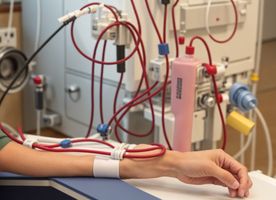Nephrology in Bang Bua Thong
Search and Compare the Best Clinics and Doctors at the Lowest Prices for Nephrology in Bang Bua Thong
Kasemrad Rattanatibeth Hospital





Nephrology at Kasemrad Rattanatibeth Hospital in Nonthaburi, Thailand
Our partner clinics in Bang Bua Thong are accredited by the following associations












































































































































No Time?
Tell us what you're looking for and we'll reach out to the top clinics all at once
WHY US?












































































































































No Time?
Tell us what you're looking for and we'll reach out to the top clinics all at once
Nephrology is a branch of medicine that deals with the kidneys, specifically normal kidney function, the preservation of kidney health, kidney disease, and the treatment of kidney disease. A physician who specializes in the care and treatment of kidney disease is called a nephrologist.
Some of the most common conditions nephrologist treat are as follows:
- Advanced or chronic kidney disease
- Tubulointerstitial kidney diseases
- Tubular defects
- Glomerular conditions, such as nephrotic syndrome and glomerulonephritis
- Kidney infections
- Kidney vascular conditions
- Kidney neoplasms
- High blood pressure
- Structural or functional abnormalities of the kidney, urine collection system, or bladder
- Vasculitis
- Electrolyte, fluid, and acid-base imbalances or disturbances
- Autoimmune conditions that involve the kidneys
Nephrologists can perform a wide range of tests, procedures, and treatments. These include:
- Blood tests, including serum creatinine, glomerular filtration rate, and blood urea nitrogen.
- Urine tests, including urinalysis, 24-hour urine test, creatinine clearance, and microalbuminuria.
- Imaging tests of the kidneys, such as CT scans, ultrasounds, or X-rays.
- Dialysis, including placement of the dialysis catheter.
- Kidney biopsy.
- Kidney transplants.
How Long Should I Stay in Bang Bua Thong?
After laboratory tests (blood and urine tests) and imaging tests, you should be able to leave the hospital right away, while with biopsy, you may need to stay overnight. However, you may need to stay in Bang Bua Thong for a few more days to wait for the results. Once the results are ready, your nephrologist will explain them during a follow-up appointment. After kidney transplants, you usually need to stay in the hospital for 5 to 10 days and stay for 7 to 14 more days in Bang Bua Thong. During your stay, ensure to attend all of the scheduled follow-up checkups with your nephrologist.
What's the Expected Recovery Time?
Recovery time depends on the type of procedure you underwent. For laboratory and imaging tests, you should be able to resume your normal daily activities immediately, though your nephrologist may advise you to rest for the remainder of the day. After a biopsy, avoid strenuous activity for 2 to 3 days. Since a kidney transplant is a major surgery, the recovery time until you can return to work and other normal activities may take around 8 weeks.
What Aftercare is Required?
Your nephrologist will give you aftercare instructions that you will need to follow and you will also need to make healthy lifestyle changes to maintain the health of your kidney after treatment. You will need to attend regular checkups to check how well your new kidney is working and also will be taking medication for the rest of your life, including drugs called immunosuppressant’s to help keep your immune system from rejecting and attacking your new kidney.
What's the Success Rate?
As the field of nephrology continues to advance, the outcomes of tests and treatments are constantly improving. This means that patients now have more chances to be diagnosed early and receive successful treatments. The success rate for nephrology procedures is proven to be generally high. For example, 93% of kidney transplants are working at the end of the 1st year. However, every procedure always comes with risks, such as infection, excessive bleeding, and damage to other organs.
Are there Alternatives?
There is no alternative to seeing a nephrologist if you have kidney problems. If your condition is found to be caused by problems in other organs, your nephrologist may work with or refer you to the relevant specialist.
This information has been accurately sourced and verified by a medical professional for its accuracy, however, we strongly recommend you to consult with your doctor before pursuing medical procedures overseas.












